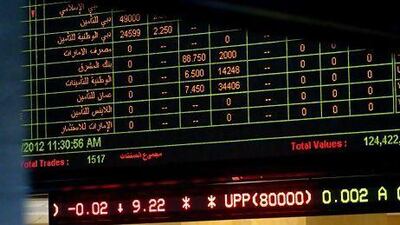The stock market regulator has barred its own directors from leaking inside information and obliged them to disclose the shareholdings of their spouses and children in a new rule introduced yesterday.
The Securities and Commodities Authority (SCA) has come under growing pressure to tighten rules on disclosure and transparency in a bid to win the confidence of foreign investors and gain emerging market status.
The regulator's director must "respect the confidentiality of all information and data gained access to or that came to his knowledge as a result of his membership to the board, so long as the information is a classified one," the regulation published on the SCA website said.
The board member also shall "not keep any paper or confidential document related to the SCA without approval from the board".
Directors "shall disclose in writing, as soon as he assumed post, all the securities he owns or those owned by his wife and underage children, as well as his share or the shares of his wife and underage children with any broker," said the amended regulation in Article 11 concerning disclosure and transparency.
Previously, SCA's board members were required to disclose only their own holdings in a company.
The new rule also specifies that a board member is also obliged to "disclose in writing any change that may arise from same within a maximum period of one week from the date of his awareness of change".
Industry analysts said the move to target not just the individual holdings of a board member but also that of his or her family would be regarded as a step in the right direction.
Retail investors, who make up more than 80 per cent of the trading activity on the UAE bourses, still need to be educated in best practice, said Wadah Al Taha, the chief investment officer at Al Zarooni Group, an investment company in Dubai.
"It's good that they are addressing this issue and giving it priority," Mr Al Taha said.
The regulator should adopt the same level of stringent disclosure to private companies and their subsidiaries, Mr Al Taha added.
The ban on leaking inside information goes some way to address calls for more disclosure by companies seeking to buy stakes in listed firms.
In March, the Dubai Financial Market (DFM) announced Aabar Investments, an Abu Dhabi state-controlled fund, had built up a 5 per cent stake in Arabtec. Yesterday, the DFM announced Aabar had increased its stake in Arabtec to 21.57 per cent.
The Financial Services Association said while there was no suggestion that either Aabar or Arabtec had broken laws on disclosure, the trades may have revealed a “grey area” in market regulation that should be examined.
"This also needs to be reviewed and addressed by SCA to strengthen disclosure and transparency, its not just important for local and regional investors, but to entice foreign investors to come back and trade on our markets," Mr Al Taha said.
Foreign investors have been virtually absent from trading on the markets since the Dubai market crash of 2009, after the emirate's debt crisis and its subsequent debt restructuring shook confidence.
The UAE is under review for an upgrading to emerging market status in June by the index compiler MSCI. It is currently classified as a frontier market.
twitter: Follow and share our breaking business news. Follow us
iPad users can follow our twitterfeed via Flipboard - just search for Ind_Insights on the app.

